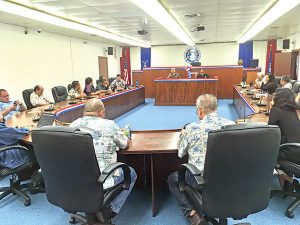Economic impact in the crosshairs

Members of the House of Representatives hold an emergency meeting yesterday at the House chamber on Capital Hill to discuss the State of Significant Emergency declaration of Gov. Ralph DLG Torres. (IVA MAURIN)
Following Gov. Ralph DLG Torres’ declaration of a significant state of emergency in the CNMI, the House of Representatives had an emergency meeting yesterday to discuss preparations for possible budget cuts and the impact on the economy.
“This is a discussion, an informative meeting to make sure that all the members are aware of the situation,” House Speaker Blas Jonathan Attao (R-Saipan) said in an interview. “The main thing is we’ve requested, through the governor, to the United States to try to stop the flights from specific destinations.”
On the economic side, it was also intended to make sure that that the legislators are prepared to work on bills that would produce economic activity or generate revenue for the islands, Attao added.
Torres earlier stated that with the Department of Finance and the Office of Management and Budget already making assessments based on the reduced tourist arrivals from China, the administration will be determining with the Legislature the potential impact on the fiscal year 2020 budget, as well as projections for the fiscal year 2021 budget.
Across the board
When asked by Rep. Joel Camacho (R-Saipan) about revising the 2020 budget once the numbers are in, the House speaker said there are two possible options: revisiting the current budget and changing the numbers, or implementing an across-the-board budget cut.
It is “easier to do the across-the-board,” Attao added. “It’s going to affect every single line item with a budget. That’s one thing that’s equal to everybody.”
“The governor can do an across-the-board cut through the emergency powers in the Planning and Budgeting Act. That’s the fastest way and it has less impact in totality,” Attao added.
“What we want to [do]…is to prevent panic, and also to [build] the understanding that, yes, our current economic situation possibly will be affected, but our health is a priority,” he added.
Revisiting the past
Faced with possible budget cuts, the legislators talked about revisiting some crisis that hit the CNMI in the past, such as the SARS epidemic and the Asian economic crisis, and learning from them.
Attao said that he has asked the fiscal auditors to look back at the SARS epidemic, the Asian economic crisis, and the departure of the garment industry.
“We’ve been through this in the past, so we need to utilize the information that we got from the past to be able to project forward,” he said.
“I brought this up because we’re looking at historical data when I was looking at the Asian economic crisis, which hit the Japanese market back in ’98-’99,” the House Speaker added.
“When we were slowly recovering back with the Japanese market, the SARS epidemic hit back in 2002. We’ve faced these types of stuff, but we need to utilize the information that we got back then to be able to project for the future,” he added.
Attao stressed that if there’s something that history teaches us, it’s not to repeat the past. If there is something that worked really well or didn’t work well then, the CNMI should use what worked well and improve on what didn’t work so well, he added.
“We all understand that it’s going to be a big financial impact, a big economic hit to the CNMI, but the health of our people is our No. 1 priority. We’re here to serve our people, we’re here to find solutions to better their lives,” Attao said.























